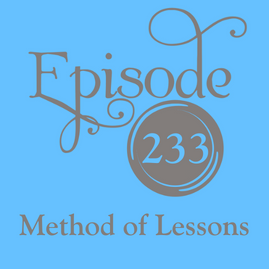
Charlotte Mason advocated a “method” of lessons, which included comments to the teacher about preparing for lessons. What is included in this practice, why is it necessary or helpful, and how do we implement effective planning? Lessons are far more than simply reading and narrating. Keeping students on track throughout a school year takes some vigilant and diligent work on the teacher’s part. Enjoy this re-release of a former episode with relevance for every single school week.
Listen Now:

“In the first place, we have no system of education. We hold that great things, such as nature, life, education, are ‘cabined, cribbed, confined,’ in proportion as they are systematised. We have a method of education, it is true, but method is no more than a way to an end, and is free, yielding, adaptive as Nature herself. Method has a few comprehensive laws according to which details shape themselves, as one naturally shapes one’s behaviour to the acknowledged law that fire burns. System, on the contrary, has an infinity of rules and instructions as to what you are to do and how you are to do it. Method in education follows Nature humbly; stands aside and gives her fair play.” (2/168)
“Before the reading for the day begins, the teacher should talk a little (and get the children to talk) about the last lesson, with a few words about what is to be read, in order that the children may be animated by expectation, and, especially of forestalling the narrative. Then, she may read two or three pages, enough to include an episode; after that, let her call upon the children to narrate–in turns, if there be several of them…It is not wise to tease them with corrections…The book should always be deeply interesting, and when the narration is over, there should be a little talk in which moral points are brought out, pictures shown to illustrate the lesson, or diagrams drawn on the blackboard.” (1/232-233)
“The teacher’s part in this regard is to see and feel for himself, and then to rouse his pupils by an appreciative look or word, but to beware how he deadens the impression by a flood of talk.” (3/179)
“The teacher’s part is, in the first place, to see what is to be done, to look over the work of the day in advance and see what mental discipline, as well as what vital knowledge, this and that lesson afford; and then to set such questions and such tasks as shall give full scope to his pupils’ mental activity.” (3/180-181)
“The teacher who allows his scholars the freedom of the city of books is at liberty to be their guide, philosopher and friend ; and is no longer the mere instrument of forcible intellectual feeding.” (6/32)
“Perhaps the chief function of a teacher is to distinguish information from knowledge in the acquisitions of his pupils. Because knowledge is power, the child who has got knowledge will certainly show power in dealing with it. He will recast, condense, illustrate, or narrate with vividness and with freedom in the arrangement of his words. The child who has got only information will write and speak in the stereotyped phrases of his text-book, or will mangle in his notes the words of his teacher.” (3.225)
“Our part is to remove obstructions and to give stimulus and guidance to the child who is trying to get into touch with the universe of things and thoughts which belongs to him. Our deadly error is to suppose that we are his showman to the universe; and, not only so, but that there is no community at all between child and universe unless such as we choose to set up.” (3/188)
“Teaching must not be Obtrusive.-Half the teaching one hears and sees is more or less obtrusive. The oral lesson and the lecture, with their accompanying notes, give very little scope for the establishment of relations with great minds and various minds. The child who learns his science from a text-book, though he go to Nature for illustrations, and he who gets his information from object-lessons, has no chance of forming relations with things as they are, because his kindly obtrusive teacher makes him believe that to know about things is the same thing as knowing them personally; though every child knows that to know about Prince Edward is by no means the same thing as knowing the boy-prince. We study in many ways the art of standing aside.” (3/66)
“Let the pupil write for himself half a dozen questions which cover the passage studied; he need not write the answers if he be taught that the mind can know nothing but what it can produce in the form of an answer to a question put by the mind to itself.” (3/181)
Notes of Conference Lessons, here and here

Episode 33: Scheduling a CM Education
Lesson Planning in a Living Education Teacher Training Video
